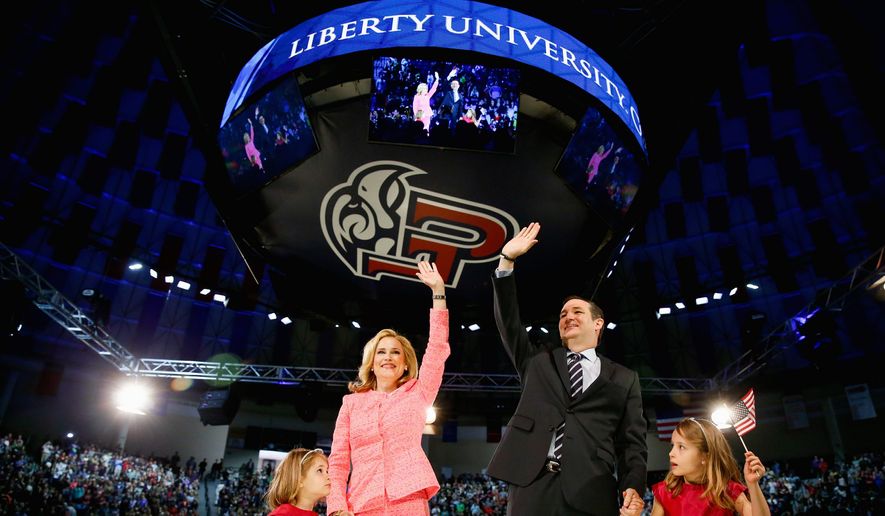Hundreds of Evangelical pastors and their wives will descend on Las Vegas Thursday to learn how to motivate their congregations to get out and vote, preferably for social conservatives.
David Lane, an evangelical political activist and event sponsor, is eager to get preachers to tackle government policies from the pulpit and energize the estimated 30 to 40 million evangelical Christians who are not registered to vote.
“Somebody’s principles are going to reign supreme, it’s either our principles or somebody else’s principles,” said Mr. Lane. “By us staying home, we’re electing people who oppose our values. Evangelical believers and pro-life Catholic Christians, our constituency, has to engage if we’re going to save America.”
There are about 65 to 80 million evangelical Christians in America, half of those are not registered to vote, and only about 25 percent of the ones who are registered do, according to Mr. Lane.
Republican Sen. Ted Cruz, who announced his presidential bid at the Christian-founded Liberty University last month, is depending on these votes. He’s also looking to defy some establishment Republicans and those in the media who say he’s on a fools errand.
“Today, roughly half of born-again Christians aren’t voting. They’re staying home,” said Mr. Cruz, a Texas Republican, in the speech announcing his candidacy at Liberty. “Imagine instead millions of people of faith all across America coming out to the polls and voting our values.”
Mr. Cruz detailed to the National Journal this month his plan to take the White House, which consists of two parts. The first is motivating Christians who stayed at home in the 2012 election to vote. The second is to be so true to his evangelical, constitutional values that he pulls in people who have never voted before or sways others to chose him regardless of political party.
“If you’re looking for a voting pond that’s not been fished, this is it, but it’s an ocean,” said Rick Tyler, Mr. Cruz’s campaign spokesman, of the evangelical vote. “If you can get this constitute group, which meets every Sunday in the same place — even if you moved them a little bit, say 10 percent, that’s 2.5 million new voters — which is a flood in the electorate.”
But Philip Bump, a political blogger at the Washington Post, has mocked Mr. Cruz’s evangelical strategy.
“Sen. Ted Cruz is a demonstrably smart man, having graduated from both Princeton and Harvard. It is easy to see, however, that his degrees were not in mathematics or statistics,” Mr. Bump wrote in an April column, arguing getting someone who has no voting history to vote is an uphill climb, and by Mr. Cruz not moving to the center, he won’t attract the independent voters he’s planning on.
Republicans have also been skeptical of the strategy.
George Will, a conservative columnist wrote on April 1: “Cruz, like Shakespeare’s Glendower (’I can call spirits from the vasty deep’), hopes his rhetorical powers can substantially change the composition of the Republican nominating electorate. Skeptics of Cruz’s summoning respond like Hotspur: ’But will they come when you do call for them?’”
Mr. Lane founded the American Renewal Project, the sponsor of Thursday and Friday’s Las Vegas pastor conference, and started this evangelical model with former Texas Gov. Rick Perry in 2005, He has held several events since then featuring Mr. Cruz, his father and pastor Rafael Cruz, South Carolina Gov. Nikki Haley, Louisiana Gov. Bobby Jindal, 2016 potential candidates Mike Huckabee and Rick Santorum and Sen. Rand Paul, among others.
In 2014, his group dedicated $2 million to a ground game in four embattled states with Senate races with the aim of turning out evangelicals. The American Renewal Project held “pastors and pews” events speaking about the need for preachers to engage their congregations, did voter registration drives, gave out voter guides and launched a digital strategy. The group identified 75,000 low propensity voters in each state, and targeted them with phone calls, knocking on doors, and mail.
Overall, the group estimates it turned out 141,151 votes in North Carolina, Colorado, Iowa and Arkansas combined. Republican senators won each of those contests, and overall, only 324,146 votes decided them.
“We did 20 pastors and pew events last year — we’ve put up 15,000 pastors, and housed them, fed them three meals a day, and love on them,” said Mr. Lane. “We have the goal of turning America.”
The goal of the pastor conferences is to show preachers how American history and the pulpit intertwine and the only way to get Christian values reflected in national policy is to get Christians to participate in it, said Rafael Cruz.
“There is a lot of people who are totally unaware of the Christian history of the American Revolution,” said the elder Cruz, who gives a PowerPoint presentation to other pastors dubbed “Reclaiming America: Why Pastors and Christians in General Need to be Involved in the Political Arena.”
“If we look at the Declaration of Independence there are seventeen grievances listed against King George, but what most people don’t know is that each and every one of those grievances were preached in the churches of America before they were complied in the declaration of Independence,” said the elder Cruz. “My friend David Barton has said that the Declaration of Independence could be considered a series of sermon summaries. So it was preachers from the pulpit calling out King George for the atrocities the British were perpetrating on the American people. That is our history.”
Still, skeptics are wary anything can be done to mobilize a base that historically hasn’t come out to vote or are even registered.
“If Cruz wants to count those, good luck to him,” wrote Mr. Bump.
• Kelly Riddell can be reached at kriddell@washingtontimes.com.




Please read our comment policy before commenting.